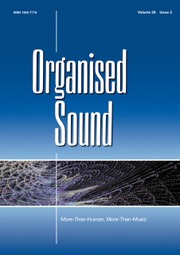No CrossRef data available.
Article contents
Code-switching and Loanwords for the Audio Engineer: The flow of terminology from science, to music, to metaphor
Published online by Cambridge University Press: 31 July 2018
Abstract
The social and sociological implications of what David Beer calls the ‘precarious double life’ of the recording engineer – a technical professional on one hand, an artistic one on the other – are only recently coming to the fore in scholarship. Bruno Latour’s Actor-Network theory and the Social Construction of Technology theory pioneered by Trevor Pinch, as well as the contributions of Susan Schmidt-Horning and Beer himself, have begun to give us an intellectual framework to examine how social forces shape sound technology and the variegated implications of that shaping.
This article examines the case of the ‘bilingualism’ required of the recording engineer. Drawing on primary sources from across the twentieth century, it traces the case of scientific terminology becoming musical terminology, that musical terminology becoming ingrained in consumer culture, and that ingrained, well-understood musical terminology becoming, finally, metaphorical.
We trace the case of spectral terminology from Joseph P. Maxfield’s articles explaining electromechanical recording to a general audience in the publication Scientific American in the 1930 s, through the application of spectral terminology in advertising during the hi-fi boom of the midcentury, and finally to the metaphorical use of the same terminology in popular music in the last two decades of the century. We show, then, that it is not only the audio engineer, but also their terminology itself that participates in a ‘double life’.
Information
- Type
- Articles
- Information
- Organised Sound , Volume 23 , Special Issue 2: New Wor(l)ds for Old Sounds , August 2018 , pp. 189 - 194
- Copyright
- © Cambridge University Press 2018

